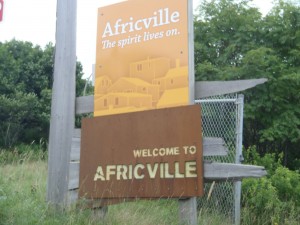 In 1970, the twin cities of Halifax and Dartmouth, Nova Scotia were paired with the West African cities of Accra and Tema, a project sponsored by the Halifax-Dartmouth World Cities Organization. As part of this project, I joined a group of students to spend a month in Ghana, participating in a project to build a school and to obtain a water supply for the town of Mpesiduase, a town which had only a contaminated pond to rely on for its needs.
In 1970, the twin cities of Halifax and Dartmouth, Nova Scotia were paired with the West African cities of Accra and Tema, a project sponsored by the Halifax-Dartmouth World Cities Organization. As part of this project, I joined a group of students to spend a month in Ghana, participating in a project to build a school and to obtain a water supply for the town of Mpesiduase, a town which had only a contaminated pond to rely on for its needs.
In a supreme touch of irony, the city of Halifax that same year expelled the last resident and tore down the last expropriated home in Africville, a 172 year old community of African-Canadians within the boundaries of Halifax that had never received a municipal water supply and had to rely on contaminated springs for its needs. As recently as 37 years before my trip, which also included a project helping to build a school house in Africa, the town of Africville still had no teachers in its elementary school with any formal training!
Forty-three years after my visit to Ghana I found myself driving through industrial Halifax, down the Africville Road to visit the reconstructed Seaview African United Baptist Church. Here I met Africville Heritage Trust’s Tracey McCallum who explained that the original Africville Church was torn down in the dead of night in 1969. In violation of a promise to residents to demolish the building last, this act struck the death knell for residents who had been determined to resist forced expropriation of the community.
McCallum, assistant director of the Africville Heritage Trust, explained that this was the coup de grace of a long campaign to free up the land on which the community rested for proposed industrial development. Commencing in 1853 with the construction of the Rock Head prison every sort of undesirable enterprise was placed on Africville’s doorstep. In 1870 an infectious disease hospital, with open pits of contaminated waste and sewage was built adjacent to the town. A slaughterhouse and then a storage area for fecal waste from another community ensued, culminating with the town garbage dump being established on the community’s door step in 1958. McCallum describes how the dump swarmed with rats, the surface of the mounds of refuse literally writhing with the vermin. Africville residents, used to turning lemons into lemonade, would salvage goods and recycle from them for the dump, long before the Halifax Regional Municipality began its much vaunted recycling program a few years ago.
Being deprived of water, sewage, garbage collection and having no basic services, the residents once numbering 400, nevertheless forged a tight knit community with strong family values, centered around the church. The popular religious services were often attended by whites as well as blacks seeking a little enthusiasm in their spiritual lives.
Much like the outport communities of my home province of Newfoundland, everyone in Africville knew everyone else and a child could go into any home knowing that he or she would receive a smile and perhaps a snack of homemade bread and molasses or jam. Neighbors took time to say hello, shake a hand or share a hug. Unfortunately these qualities cannot be quantified by numbers and statistics and are therefore not often valued.
Thus, given the placement of every type of undesirable enterprise in its proximity, and the lack of basic facilities that other areas of the city took for granted, the town, not surprisingly, came to be regarded as a “slum”. One wonders how any other part of the city, subjected to similar treatment, would be designated. City council decided unanimously in 1962 that “for their own good” residents would be relocated. From 1964- 1967 this policy was implemented. The move was accomplished using municipal garbage trucks.
By 1970 the last resident was gone, the last home demolished and Africville’s community was scattered, its spirit and cohesiveness shattered.
This sad event might have remained another dismal foot note in history, much like the expulsion of Nova Scotia’s French-speaking Acadian residents. But unlike the Acadians, many of the Africville residents who were expelled are still alive today. Thanks to their efforts and those of others with a social conscience, Africville was declared a National Historic Site in 2002.
In 2005 Nova Scotia New Democratic Party MLA, Maureen MacDonald, introduced the Africville Act to the provincial legislature. This act called for a formal apology to the former Africville residents and the formation of a development fund. In February, 2010, Halifax Mayor Peter Kelly made a formal apology as part of a 4.5 million dollar compensation package which included the reconstruction in 2011 of the Seaview African United Baptist Church and the renaming of the adjacent Seaview Park, built on former lands of the Africville community.
Ms. McCallum admitted that while this was a start there are still many issues that needed to be dealt with. For example the Africville Park adjacent to the church, is a dog park where dogs freely defecate on land where her predecessors once lived. She says this is the only National Historic Site in Canada where this practice is tolerated. Signage for the National Historic Site has been sparse until recently though this has been partially corrected.
On a brighter note Ms. McCallum tells me the numbers of visitors has been steadily increasing and people from outside the region are now starting to drop in to share the Africville story. One day soon it is hoped that the grounds of the park will be amalgamated with the church, much as has been done with the Grand Pre National Historic Site where a reconstructed church sits among well-tended gardens, ponds and trees, commemorating the expulsion of the Acadian people. A fence currently separates the Africville Church and the park which disrupts the cohesiveness of the site and its experience.
In the near future, visitors should be able to wander gardens and enjoy the reconstructed church, nestled among a grove of trees, washed by salt-water breezes and lulled by the sound of lapping waves. Perhaps they will contemplate racism and injustice and forge a link with a bygone past of laughing children, smiling elders, rollicking church services and a community that endured more than 150 years…but is no more.
Photo Credits
All photos courtesy of The Africville Hertiage Trust

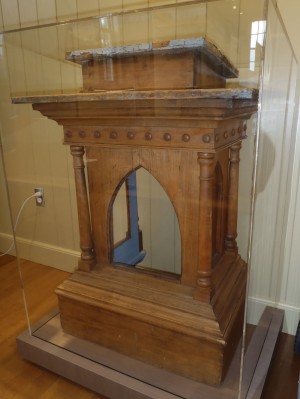
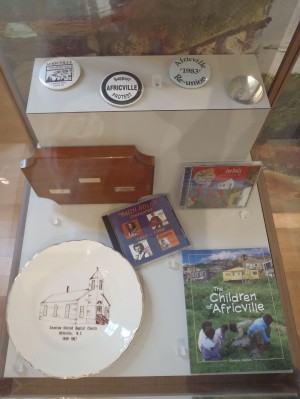
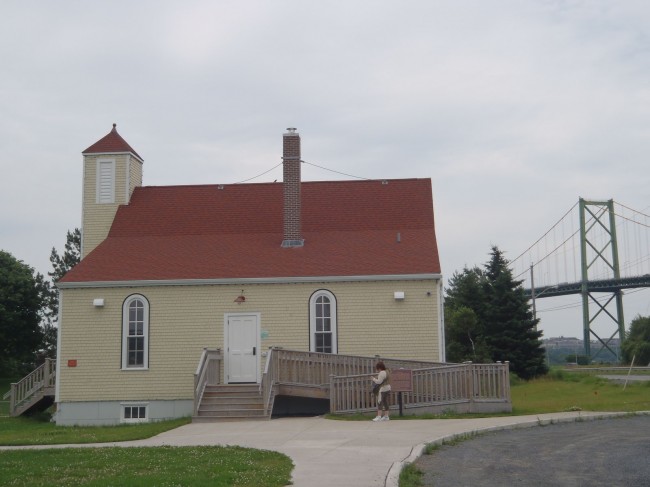
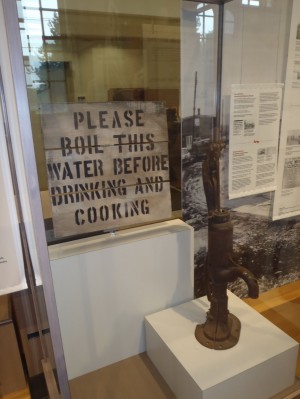
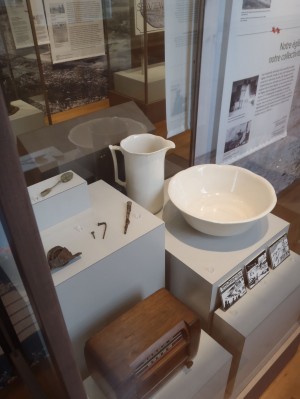

Wonderful evocative and informative article, George. Thank you.
I am glad you enjoyed the article Ross. Africville is an interesting place with a lot a history.